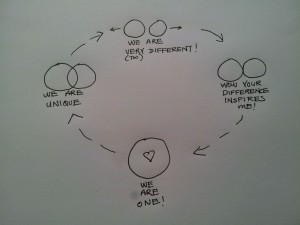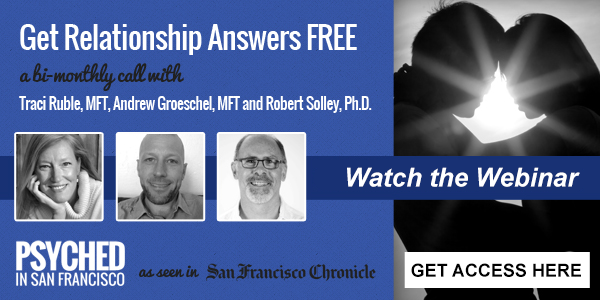The Cyclical Stages of Love: Couples Counseling Insights
What do lovers and mothers have in common?
I am getting ready to head out on vacation, and it is an interesting time for me for two reasons. First, I like to reflect on my work before taking my big annual vacation. Second, I have to plan, pack, and arrange for two young sons on an international flight with my husband. And that nimble planning, packing, and relating dance has an energy that I find oddly connected to my work as a couples therapist.
It goes something like this; pack and nag, then get really ticked off, stamp my feet, long to blurt a disparaging comment at my husband, and instead give myself a pep talk and do what I call the “stop, drop, and roll”: feeling the raw body sensations and electricity of emotions coursing through me without analyzing any of it. When I do this, I calm down and am able (and willing) to look this guy in the eyes here packing with me. And I am in awe. I feel something like, “wow, I am still getting to know you, even though I have known you for 24 years.”
This happens several times a year—this man becomes a curious surprise. Do I know him? Do I like what I find or does it unnerve me? And then in that calmness and curiosity I tend to notice a new expression on his face or a new freckle. Tolerating the anxiety of the unknown leads me to a fresh moment of attraction, a new beginning. I really dig being a couples therapist for similar reasons—seeing renewal in relationships. I have invested in a lot of training over the years but no training has proved more valuable than the one I have received relating to my husband. And so as I reflect over the past year, I note that I don’t write that much on Psyched Magazine about my central passion: working with couples.
Why do I like doing couples work? Well, I lived through many (think: Elizabeth Taylor) divorces as a kid. I joke that I have been doing couples work since I was four. Of course, much of my ability to be present with couples is owed to my own twenty years on a therapy couch (held with pride). But oddly, after all the divorces I witnessed I am not jaded but fascinated by modern relationships. I have spent my career devouring trainings and research on couples, so that now when two people sit down and share the personal details of their love and their fears about their love (on display as hatred, dispassionate avoidance, heartache and even agony)—I am just excited to dive in.
I leverage much of the attachment-based thinking that is the zeitgeist among many great couples therapists today. I also use the “Traci Ruble technique,” my own art, honed with the help of couples I have worked with over the last ten years. In an odd sort of way it is their “school” (the couple) rather than the “Traci Ruble school” but I can’t name them, so I write this in honor of them.
I also want to say that I really empathize with what it must be like to be a man entering couples therapy, because I think it can be different than many women. Where women, perhaps, are at an advantage with the way their gender training taught them to express feelings, men often enter couples therapy worried they will be ganged up on or emasculated, and with less experience naming their emotions. I love helping men and women feel the differences in how they were shaped to think, feel, and talk from the culture at large. Gender-training is actually an often-overlooked theme in couples therapy, but making it a key dialogue point early on helps men and women feel safer and more at ease in therapy.
Here are a number of other ways I think about couples therapy and work with couples, offered in the hope that they will be useful to everyone who is in a relationship. My hope is these simple stages will help you make sense of your relationship and help you and your partner feel eager to take advantage of the benefits of couples therapy when the timing calls.
Identifying relationship stages and finding your stage
I like to educate clients in simple language so the therapy is their own and they understand my approach enough to make an informed choice about the way we work. I offer up an attachment view of relating in my own language early on, explaining the ways that we attached in early life to our primary caregivers can effect our actions in adult relationships today. It may feel reductionistic when you read it, but keep in mind that over the course of therapy the nuances are teased out (feelings, memories, stories, reactions). The intent is to create a clear roadmap for the therapy by understanding how each client comes to attachment. Later, in the middle stages of couples therapy the more detailed topography and terrain of each relationship is mapped.
Couples have developmental stages just like human beings do
Often one or both partners get stuck or lack the skills to complete a developmental stage. See the drawing I share with couples to help us all get on the same page. This drawing leaves couples feeling sane and normal, and has been a fast and easy way to share knowledge. It also helps the couple feel like the directors of their own therapy session and their overall progress.
Stage one: we are one
When we fall in love, we are in bliss and feel like we are one person, similar to a newborn and his or her mother. Attachment theory takes this point of view based on research that romantic love and its development is similar to that of an infant and mother. “We are one” is the felt sense of a new love and a new infant with its mother. But for instance when a baby begins to crawl and walk he or she becomes aware the mother is separate. Couples similarly develop out of the early romantic phase , fueled by a great cocktail of dopamine, norepinephrine and serotonin. The “we are one” chemicals are used up by 25 months. So the couple either psychologically tries staying as a “we are one” unit or they progress and begin the individuating process, similar to the infant’s determination to pull herself up on her own legs and move off to explore.
Stage two: we are unique or different
At first our partner’s differences or his or her walking away from us to explore can be cute. “Oh look you are different than me, that is so sweet and inspiring” but by the time we get to the third stage (“we are very different”) couples can just plain freak out. “Did I choose the wrong person?” or “are they abandoning me because they are pursuing their own different thing?” comes up for some couples, others might eagerly arrive at the independent stage and try to keep the relationship in the “we are very different” distance for too long, eroding connection. The most typical dynamic I see is one partner likes that “we are different” stage and tries to stay there, while another prefers the “we are one” stage and tries to stay there. This is well known as the “pursuer-distancer stance”.
Stage three: we are very (too) different
Traversing the “we are very (too) different” stage is the stage in which most couples enter couples therapy. What they learn is that a couple rotates around the stages many times in a lifetime and couples that master these stages keep their relationship exciting. It sounds easy but it takes some emotional and relational chops and stamina. There are two goals I have in mind for couples throughout the process of doing work on these developmental stages. One, each person needs to identify their personal triggers or patterns that tend to keep them stuck in a stage. Two, they need to learn the psychological and emotional skills to move through every stage with grace and without losing connection. I like to talk about the life events that tend to spur a new stage. For example, having a baby can spark the “we are one” for a few months after the baby arrives, and then as the man feels sidelined the “we are very different” stage can follow. Next the long co-parenting project can keep parents in a very distant state for too long if not tended to with awareness. We plan ahead for relationship changes in the before-baby counseling work I do.
Stage four: wow your difference inspires me
I am finishing this article now while on vacation. My husband and I were sitting on our very long international flight about 40 rows apart from each other. He said to me, as we exited, that he had felt gratitude for me and our family during that flight and felt a desire to connect with me. My suspicion is, had we been in the same row he might not have—we might have been having the bickering fights that ensue when there is a need for some distance. But traversing through stage three (“we are very different”) 40 rows apart, without getting triggered, we arrived at “your difference inspires me”. A nice way to start a vacation.
Ultimately, as couples move through the very tricky terrain of stage three, our differences that at first were scary (making us doubt our partner or ourselves) can become a source of inspiration and renewed passion. There must be some significant willingness to calm our ego, to tolerate the unknown, to risk feeling a little unstable with our partner, but in this territory lies renewed gratitude, passion and connection. And then we find ourselves back in a stage one romance all over again. And so it goes.



